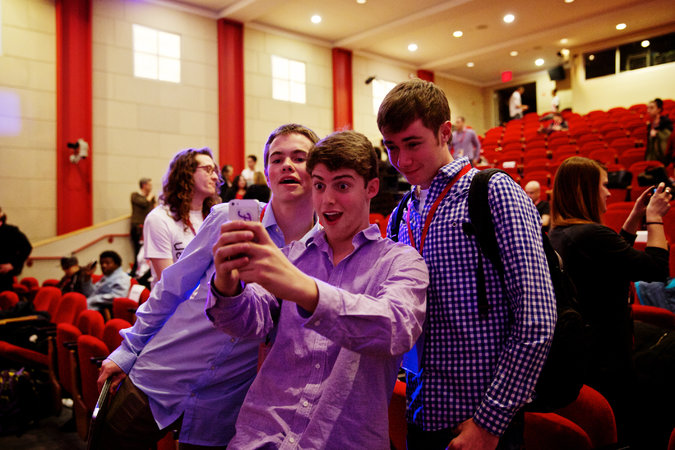Ryan [Orbuch]… is among the many entrepreneurially minded, technologically skilled teenagers who are striving to do serious business. Their work is enabled by low-cost or free tools to make apps or to design games, and they are encouraged by tech companies and grown-ups in the field who urge them, sometimes with financial support, to accelerate their transition into “the real world.” This surge in youthful innovation and entrepreneurship looks “unprecedented,” said Gary Becker, a University of Chicago economist and a Nobel laureate.
Dr. Becker is assessing this subject from a particularly intimate vantage point. His grandson, Louis Harboe, 18, is a friend of Ryan’s, a technological teenager who makes Ryan look like a late bloomer. Louis, pronounced Louie, got his first freelance gig at the age of 12, designing the interface for an iPhone game. At 16, Louis, who lives with his parents in Chicago, took a summer design internship at Square, an online and mobile payment company in San Francisco, earning $1,000 a week plus a $1,000 housing stipend.
Ryan and Louis, who met online in the informal network of young developers, are hanging out this weekend in Austin at South by Southwest. They are also waiting to hear from the colleges to which they applied last fall — part of the parallel universe they also live in, the traditional one with grades and SATs and teenage responsibilities. But unlike their peers for whom college is the singular focus, they have pondered whether to go at all. It’s a good kind of problem, the kind faced by great high-school athletes or child actors who can try going pro, along with all the risk that entails.
Dr. Becker, who studies microeconomics and education, has been telling his grandson: “Go to college. Go to college.” College, he says, is the clear step to economic success. “The evidence is overwhelming.”
But the “do it now” idea, evangelized on a digital pulpit, can feel more immediate than academic empiricism. “College is not a prerequisite,” said Jess Teutonico, who runs TEDxTeen, a version of the TED talks and conferences for youth, where Ryan spoke a few weeks ago. “These kids are motivated to take over the world,” she said. “They need it fast. They need it now.”
The college-or-not debate neglects other questions that high school students like Ryan and Louis and their families are wrestling with now: Go to class or on a business trip? Do grades still matter? What do you do with $20,000 when you’re 15? And when the money rolls in, what happens to parental control?
“Things used to be linear. You went to a good school and you got a good job, and that was the societally acceptable thing to do,” said Ms. Stern, Ryan’s mother, who was a straight-A student and is a graduate of Duke University.
Now, she said, “there is no rule book.”
-
Recent Posts
- Team unearths what may be secret weapon against antibiotic resistance
- Hazing: How to hide in nearly plain sight | Student Science
- 3quarksdaily: Philosophy is a Bunch of Empty Ideas: Interview with Peter Unger
- Thirst for water moves and shakes California | Student Science
- Digital displays get flexible | Student Science
Recent Comments
- Jeff Ollerton on 56 Indicators of Impact
- Jodie on 56 Indicators of Impact
- Brigitte on From Peer Review to the Wisdom of Crowds? Open Access & Peer Review | History Workshop
- Adam on Scenes from another academic conference
- Altmetrics: achieving and measuring success in communicating research in the digital age | Hazel Hall on 56 Indicators of Impact
Archives
- June 2014
- May 2014
- April 2014
- March 2014
- February 2014
- January 2014
- December 2013
- November 2013
- October 2013
- September 2013
- August 2013
- July 2013
- June 2013
- May 2013
- April 2013
- March 2013
- February 2013
- January 2013
- December 2012
- November 2012
- October 2012
- September 2012
- August 2012
- July 2012
- June 2012
- May 2012
- April 2012
- March 2012
- February 2012
- January 2012
- December 2011
- November 2011
- October 2011
- September 2011
- August 2011
- July 2011
- June 2011
- May 2011
- April 2011
- March 2011
- February 2011
- January 2011
- December 2010
- November 2010
Categories
- Accountability
- Basic News
- Broader Impacts
- Calls for papers
- Climate Change
- Conferences Upcoming
- Convergence
- Creative & Visual Science
- CSID Publications
- Degrowth Economics
- Economics & STEM Research
- Environmental policy
- Field Philosophy
- Future of the University
- Gas Fracking
- Globalization
- Graduate Studies
- Innovation
- institutionalizing interdisciplinarity
- Interdisciplinarity
- Libraries
- Metrics
- Multidisciplinarity
- NASA
- New Books
- New Lexicon
- NIH
- NOAA
- NSF
- Occupy Wall Street
- Open Access
- Peer Review
- Philosophy & Politics
- Public Pedagogy
- Public Philosophizing
- Science and technology ramifications
- STEM Policy
- Sustainability, Risk Management, & Long-Term Security
- TechnoScience & Technoscientism
- Transdisciplinarity
- Transformative Research
- Uncategorized
- US Science Agencies
Meta


